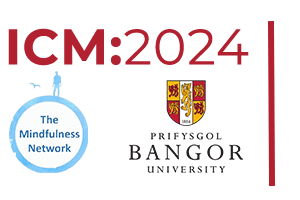Scientific Research, Theory and Pedagogy
How do we examine mindfulness?
In this strand, we’ll take a big-picture look at where the mindfulness field stands in the worlds of science, research, and theory. We’ll consider the strengths and vulnerabilities of what we know about mindfulness-based approaches. There will be opportunities to hear from experienced researchers, reflect on their research experiences, and discuss where we should head next.
Strand 1 includes but is not limited to:
- Innovative research methods
- Mechanisms of mindfulness
- Pedagogy of mindfulness
- Approaches to measuring mindfulness
- The challenges of research methodologies in mindfulness research
- Innovative pedagogical approaches
- Ethics
Strand 1 begins with a Keynote from Sona Dimidjian. After this you can choose to attend either: a related panel discussion, workshop, research symposium, or guided practice, which will be held across various spaces in Bangor University’s Pontio Centre.
keynote
Contemplative Science and Practice: Embracing the fullness of what we do and who we are with Sona Dimidjian
Commitment to alleviating individual and social suffering draws many of us to this field and together at this conference. How can we harness the promise of contemplative science and practice to be of greatest benefit? How can we most effectively promote individual healing and social change? Together, we will explore the evidence base for mindfulness-based interventions and identify ways to strengthen the potential of our work to impact positively the mental health needs of individuals and communities. We will engage the relevance of contemplative science not only for what we do but also who we are and how to live more fully our shared intention to create a better future for all.
panel
- Anne Speckens, MD PhD (Chair)
- Lone Fjorback, MD PhD
- Willem Kuyken, PhD Professor
- Sona Dimidjian, PhD Professor
What have we learnt from the past and what are our hopes for the future?
An exchange between the “elders of the field” about the state of the evidence for mindfulness-based interventions, possible gaps and identifying ways to take the field forwards.
The contributors of the panel will shortly present what they view as the most important evidence of MBIs in their respective fields. We will then have a discussion about the potentially unanswered questions in the research as it has been conducted so far and present some important and promising ways forward. We intend to have a lively exchange with the audience.
workshop
Mindful Publishing in the AI Era: An Editor’s Perspective on Trends, Challenges, and Insights in Mindfulness Research with Oleg Medvedev.
In an age where AI influences many facets of academic pursuit, the dissemination of mindfulness research is undergoing significant transformation. This workshop delivers an editor's perspective on the latest trends in mindfulness research, navigating through the possibilities and perils that AI presents to scholarly publishing. Our focus shifts to the core trends revolutionizing how mindfulness research reaches academic and public domains. We delve into how AI impacts the success rates of paper acceptance and publication, and the broader implications for researchers striving to contribute novel insights in a highly competitive space.
This discussion will outline the increased efficiency and new opportunities for disseminating research findings, while also considering the challenges of maintaining rigorous peer-review standards in the fast-paced digital era. From an editorial vantage point, we share insights on harnessing AI to enhance the visibility and impact of mindfulness studies, and how this influences the themes and narratives that gain prominence in the literature. The talk will reflect on the emerging challenges such as ensuring the ethical use of AI, addressing the digital divide in research accessibility, and preserving the integrity of mindfulness as a discipline amidst rapid technological change.
This workshop presentation aims to equip researchers with an understanding of current publishing trends, stimulate discussion on overcoming associated challenges, and inspire innovative approaches to sharing their work effectively. Attendees will leave with a clearer vision for navigating the evolving landscape of mindfulness research publication in the era of AI integration.
Learning aims:
1. To provide researchers with a comprehensive understanding of the latest trends in academic publishing.
2. To encourage active dialogue among participants on how to address challenges in the current publishing environment.
3. To foster the development of creative strategies for researchers to disseminate their work effectively.
4. To ensure participants gain a more defined perspective on how to successfully navigate the changing field of mindfulness research publication.
5. To prepare researchers for the implications and opportunities presented by the integration of AI within the research publication process.
References:
Medvedev, O. & Krägeloh, C. (2023). Harnessing Artifcial Intelligence for Mindfulness Research and Dissemination: Guidelines for Authors. Mindfulness, 14, 1019–1020. https://doi.org/10.1007/s12671-023-02155-y
Krägeloh, C.U., Alyami, M.M., Medvedev, O.N. (2023). AI in Questionnaire Creation: Guidelines Illustrated in AI Acceptability Instrument Development. In: Krägeloh, C.U., Alyami, M., Medvedev, O.N. (eds) International Handbook of Behavioral Health Assessment. Springer. https://doi.org/10.1007/978-3-030-89738-3_62-1
Medvedev, O.N., Krägeloh, C.U. (2023) A comprehensive matrix of factors contributing to depression. Nature Mental Health. https://doi.org/10.1038/s44220-023-00126-9
online workshop
“May we all be safe…” Exploring ethical practice in mindfulness and our duty of care to each other with Sarah Millband.
In this workshop, we’ll be weaving together ethical practice in mindfulness with good practice in safeguarding and considering our duty of care to those we come into connection with as mindfulness practitioners, whether we’re offering mindfulness in individual or group settings. Creating a learning environment that allows others to feel a simultaneous sense of safety and vulnerability is part of a set of core skills needed by those offering mindfulness-based approaches. Some of the people who are drawn to learning mindfulness – and those associated with them – may be vulnerable in other ways, however, including by being at risk of experiencing harm, abuse and neglect. Good practice in safeguarding is all about growing our awareness of safety in the wider world in which the person is living and understanding the responsibilities we have as practitioners to take preventative steps when we’re concerned that harm, abuse and neglect might happen and to take wise action when we see that it is happening. We’ll be considering the traditional ethical foundations that underpin mindfulness alongside the contemporary good practice and legal frameworks that support safeguarding. We’ll also be reflecting on attitudes, values and power dynamics and exploring how good practice in safeguarding involves ‘being with’ the other, rather than ‘doing to’ them. “May we all be safe” is a wish that we offer in our metta practice and we’ll be opening to the implications of living this aspiration, including turning towards our duty of care to each other with both compassion and wisdom.
The workshop will include some time for didactic presentation alongside individual experiential exercises, with space for guided reflections and time for considering how you might take forward your learning about ethics and safeguarding in to your own practice.
guided practice
Shifting the Narrative: Dropping Some Beats with Cathy-Mae Karelse and Kareen Griffiths
This exploration of music, mindfulness and movement will start with a brief conversation about vibration and rhythm as a universal language. We shall experience and feel how music connects us to ourselves and to one another and come to know how sound helps us create a deeper appreciation and sense of expression offering pathways of togetherness beyond words. The session provides an opportunity to listen to ourselves, our bodies, and release tensions in new ways that connect us with one another outside of language. This is the conversation of the bodies in communion with one another. Music provides avenues for making mindfulness more accessible and presents opportunities for us to break down barriers, transcend borders, and build bridges. We welcome you to join us in making this a safe space of togetherness in which we embrace the power of music to open us up to new possibilities.
Research Presentations
Here are the research sessions for Strand 1. Each session will feature selected abstracts presented in 15-minute talks, offering a chance to hear the latest cutting-edge research in the mindfulness and compassion fields. Detailed timings will be available in the full conference programme. Full abstracts will be available on the ICM:2024 Community Portal for all registered conference attendees.
Compassion and Mindfulness
-
Effects of Mindful Self-Compassion Programme on Psychological Wellbeing and Levels of Compassion in People Affected by Breast Cancer Caroline Hoffman
-
A systematic review of the relationship between compassion for self and compassion for others Ning Jia
-
Transformative Power of Online Mindfulness Training for Research Postgraduate Students: A Mixed Methods Randomized Controlled Trial Jia-Qi Xu
-
The experiences of improvement of the emotion regulation process and compassionate care after mindful self-compassion group therapy for nurses of caring for terminally ill patients - A Qualitative Study. Fei-Hsiu Hsiao
Mindfulness in Education/Mindfulness in the Workplace
-
The Impact of Mindfulness Meditation Training in a Course Titled: The Art and Science of Human Flourishing for Educators Mark Szymanski
-
Effectiveness of a blended school-based mindfulness program for the prevention of co-rumination and internalizing problems in Dutch secondary school girls: a Cluster Randomized Controlled Trial Patricia Vuijk
-
Exploring the impact of supportive social networks and barriers on the mindfulness experiences of foreign workers in Japan Roderick Bugador
-
Mindfulness in the British Civil Service - does dispositional mindfulness predict work engagement and wellbeing? Louise Banham
Models and Mechanisms of Mindfulness
-
Understanding and measuring feelings of dehumanisation in psychosis Tom Jenkins
-
Measuring Mindfulness: A New Set of PROMIS-Based Self-Report Mindfulness Questionnaires Carol M. Greco
-
Awareness-First Model (AFM) David Matta
-
Associations Between Dispositional Mindfulness, Attentional Mechanisms, and Response Inhibition: An Exploration of Behavioural Outcomes and Electrophysiological Markers Paveen Phon-Amnuaisuk
-
Meditation Interventions and Adult Attachment Orientations: A Systematic Map Taranah Gazder
MBCT for Depression: Findings from a Randomised Controlled Trial
Mindfulness-Based Interventions for Clinical Populations
-
Improved quality of life and psychological symptoms following mindfulness and cognitive rehabilitation in multiple sclerosis and their mediating role for cognition: a randomized controlled trial Anne E.M. Speckens
-
Mindfulness-based cognitive therapy to reduce psychological distress in patients with Inflammatory Bowel Disease: results of a multicentre randomised controlled trial (MindIBD) Milou ter Avestr
-
The implementation of Mindfulness-Based Cognitive Therapy to reduce psychological distress in patients with Inflammatory Bowel Disease: a qualitative study guided by the Consolidated Framework for Implementation Research. Sabien J.E. Bosman
-
Positive health outcomes in studies of mindfulness-based interventions among cancer patients and cancer survivors: A systematic review and meta-analysis Nasim Badaghi
Mindfulness for Diverse Populations
-
How do autistic adults experience contemplative practices? Findings from a qualitative study. Emily Corsellis & Kelly Birtwell
-
Mindfulness-Based Cognitive Therapy (MBCT) and Mindfulness-Based Stress Reduction (MBSR) in the treatment of Post-Traumatic Stress Disorder (PTSD): A literature review Carolina Wagner
-
Mindfulness-Based Programmes and 'Bigger Than Self' Issues Robert Callen-Davies
-
Awareness meets the default mode network: advancing our understanding of anxiety through facets of conscious experience and brain mechanisms Lia Antico
-
Effects of Sustained Mindfulness Training in Patients with Persistent Depression Jonathan Hamilton
Mindfulness Later in Life
-
Mindfulness-based intervention for loneliness in older adults: a protocol of a randomised controlled trial Daisy Dexing Zhang
-
Effects of Online Meditation on Mild Cognitive Impairment and Mild Dementia: Protocol of a Feasibility Trial Jiuhong You
-
Intervention Effectiveness of the Taking it Further 12-week Course on the Psychological Well-being of Healthy Middle-Aged and Elderly Individuals in Taiwan Debbie Hu
-
A Virtual Reality-Based Nature-Mindfulness-Compassion Program for Older Adults: Results from a Pilot Randomized Controlled Trial Isabel Sadowski
Mindfulness and Pedagogy: Supervision, Physical Environment, and Popularity.
-
Responsive Scaffolding: A grounded theory study of participant experiences of teacher contributions to Mindfulness-Based Programmes. Julia Hutchinson
-
What do Supervisors’ and Supervisees’ think about Mindfulness-Based Supervision? A Grounded Theory Study Alison Evans
-
Sharing mindfulness in context: pedagogy, practice and process Simon Whitesman
-
Exploring the impact of the physical environment on the mindfulness practices within a retreat context Damla Yurttas
-
Bottoms Up: is the popularity of mindfulness something to cheer about? Tor Walmsley & Natalie Suggs
Imagination, Humour, Memory, and Voices.
-
The Effect of Brief Mindfulness Induction on Retrieval-Induced Forgetting and Witness Memory Li-Hao Yeh
-
Exploring Interpersonal Mindfulness and Support Seeking Communication Through Linguistic Inquiry and Word Count Lynsey Michelle Medd
-
The trouble with mindfulness inductions: Lessons from an experimental study of mindfulness for voices Pamela Jacobsen
-
A Humour-enriched Mindfulness-based Program (HEMBP): Findings from two randomized controlled trials. Christian T. Kastner



